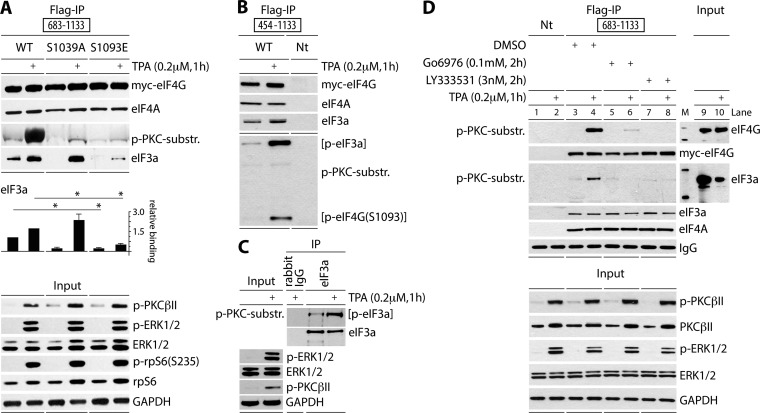FIG 3.
PKCβII phosphorylates eIF4G(S1093) and eIF3a(S1364) and controls eIF4G:eIF3 assembly. (A) HEK293 cells were transfected (16 h) for expression of tagged 683-1133 fragments, serum starved (24 h), and treated with TPA (+). Cell lysates were subjected to immunoblotting (bottom panel) or Flag IP/immunoblotting (top panel) as shown. Relative binding of eIF3a was quantified and averaged between 3 assays. Quantification between experiments was normalized by setting the value of mock stimulation with wt 683-1133 fragment to 1. Error bars represent SEM; asterisks represent Student t test results (P < 0.05). (B) HEK293 cells were transfected (16 h) for expression of Myc/Flag-tagged 454-1133 fragment, serum starved (24 h), and treated with TPA (+). Cell lysates were subjected to Flag IP/immunoblotting with the indicated antibodies. (C) HEK293 cells were serum starved (24 h) and treated with DMSO or TPA (+). Cell lysates were subjected to immunoblotting, rabbit IgG IP/immunoblotting, or eIF3a IP/immunoblotting with the indicated antibodies. (D) PKCβ inhibitors prevent eIF4G(S1093) and eIF3(S1364) phosphorylation. HEK293 cells were transfected (16 h) for expression of Myc/Flag-tagged 683-1133 fragment, serum starved (24 h), pretreated with Go6976 or LY333531 (2 h), and treated with TPA. Cell lysates were subjected to immunoblotting (bottom panel) or Flag IP/immunoblotting (top panel) with the indicated antibodies. All experiments were repeated at least three times; results from representative assays are shown.

